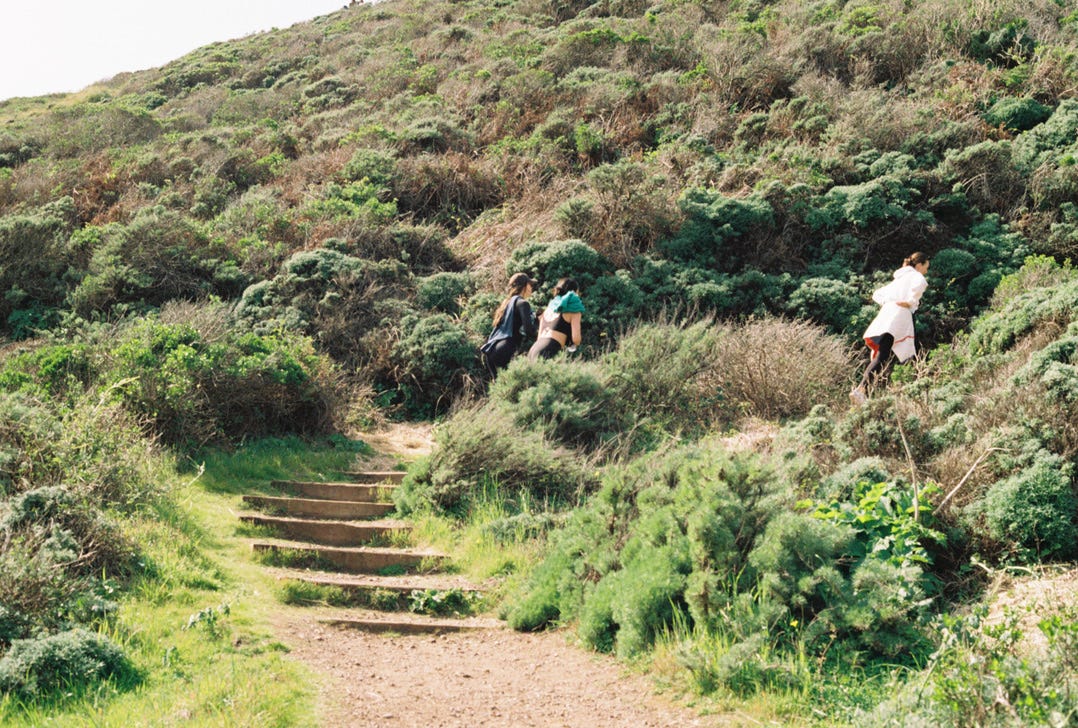The case against (inauthentic) travel
Why I think I've been traveling incorrectly, and how I'm trying to do it better
This month, I received 1,000+ reads on this blog. Thank you for that, and thank you to anyone who texts me their thoughts after a blog is posted. That discourse is a big reason for why I do this, and I am floored every day by what amazing people I have in my life.
I am writing this from Pacific City, Oregon. On my left is a cup of black coffee. Straight ahead, the Pacific Ocean. This seems as ideal of a spot to write and think as any.
I am interrupting my two-part series on personalization to write a more personal reflection about an activity I have been in the process of doing the past few days: traveling.
Travel, and how to travel well, has been a focus of my brain space this year. The focus is driven, I believe, by both the frequency with which I travel and the obvious recognition that I am doing it wrong.
What I aim for when stepping on the plane is to feed curiosity, experience unusual scenarios, and then return to work refreshed. What it turns into though is a week-long mission to check off a list of activities generated by social pressures, Instagram posts, and Pinterest blogs – a rushed attempt to see all that I should be and not just what I want to.
And so, I have been mulling the question: how do I travel better? How do I change what travel means to me and how I act on this meaning?
While I’ve wondered on this personally for some time, I recently found a shared voice in “The Case Against Travel”, a piece for the New Yorker, by Agnes Callard. Callard questions why people associate travel with personal impact and why travelers spend money and energy to visit foreign “tourist sites” that those who live there avoid. While I found the essay to be negative on travel in a way I disagreed with, a story Callard tells resonated with me.
Callard reflects on a visit to Abu Dhabi in which she attends a tour of a falcon hospital simply because she feels that she should. Because she does not like falcons, the experience is lost on her.
The takeaway is this: “When you travel, you suspend your usual standards for what usually counts as a valuable use of your time…but if you usually avoid museums, and suddenly seek them out for the purpose of experiencing a change, what are you going to make of the paintings? You may as well be in a room full of falcons.”
Traveling well, it seems, is to bring your personality and interests in your carry-on. It is customizing your own travel checklist to seek experiences around things that matter to you at home. It is going to a falcon hospital, but only if you already love falcons.
On a free day, I like to go on runs and hikes. I like to drink good coffee, read books in calm spots, and eat great dinners. I enjoy art, especially photography, but only if it is modern. I despise lines. Architecture and landscape design are, unfortunately, often lost on me.
What authentic traveling means to me is to do the things I love at home and try them in
different locations. To see what a morning run or coffee looks like in Pacific City, Oregon, Washington, DC or Sydney, Australia. To hike new trails. To order the burger and fries from the menu as usual, but do it in restaurants that span the globe. It is to collect experiences that broaden the view of what your life could look like and that can encourage you to think of and do things a little differently on your next run, coffee order, or trip to an art show.
What is lost in this approach, I recognize, is the opportunity to be wowed by the unexpected and to allow travel to not only expand current interests but to break ground on new ones. Maybe the right architecture or royal garden will peak a long-term love of design. Maybe the right baroque masterpiece will expand what I find interesting in art. This kind of impact certainly outweighs that of another run or another coffee, but the frequency with which it occurs, when considering the scarcity of your time, is too low to support.
This trip to Oregon has consisted only of activities that fit in the usual time standards: plenty of running, hiking, coffee, and good food. The pace with which I travel has slowed. The checklist has shortened, and there are more famous sites that have been left unvisited than those that have been, but I am enjoying myself immeasurably. The experiment seems to be working.





